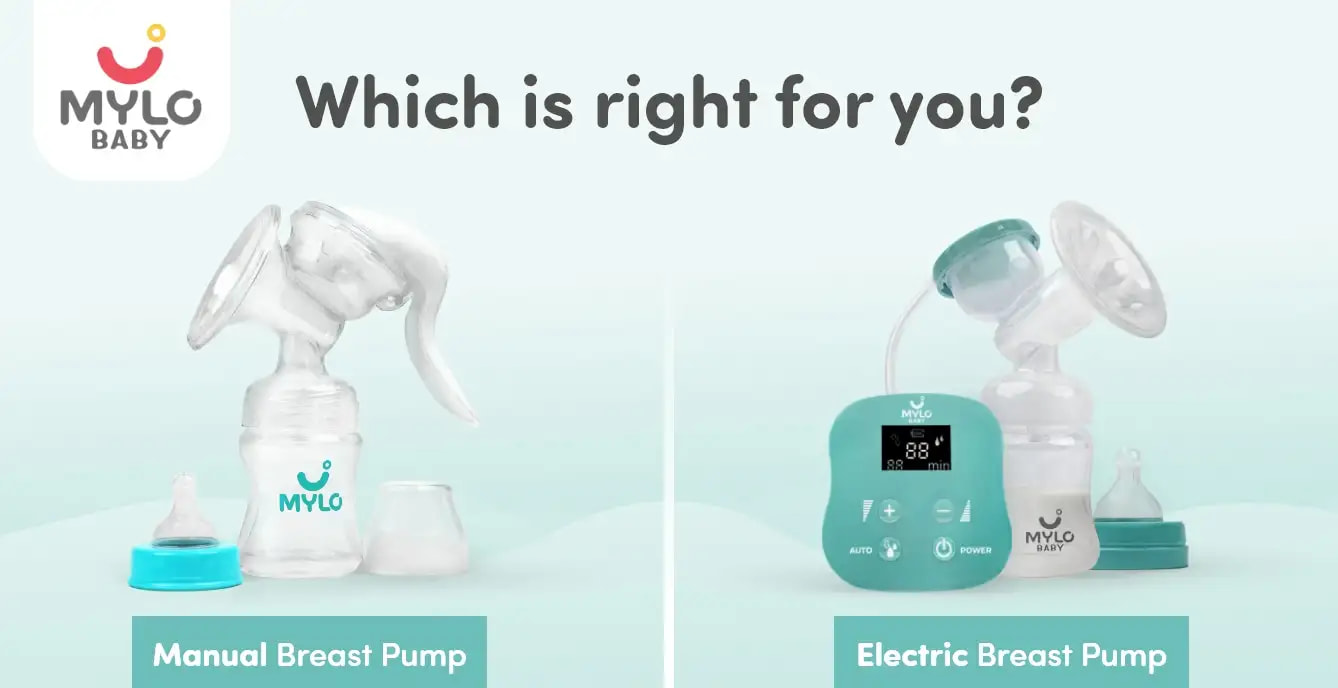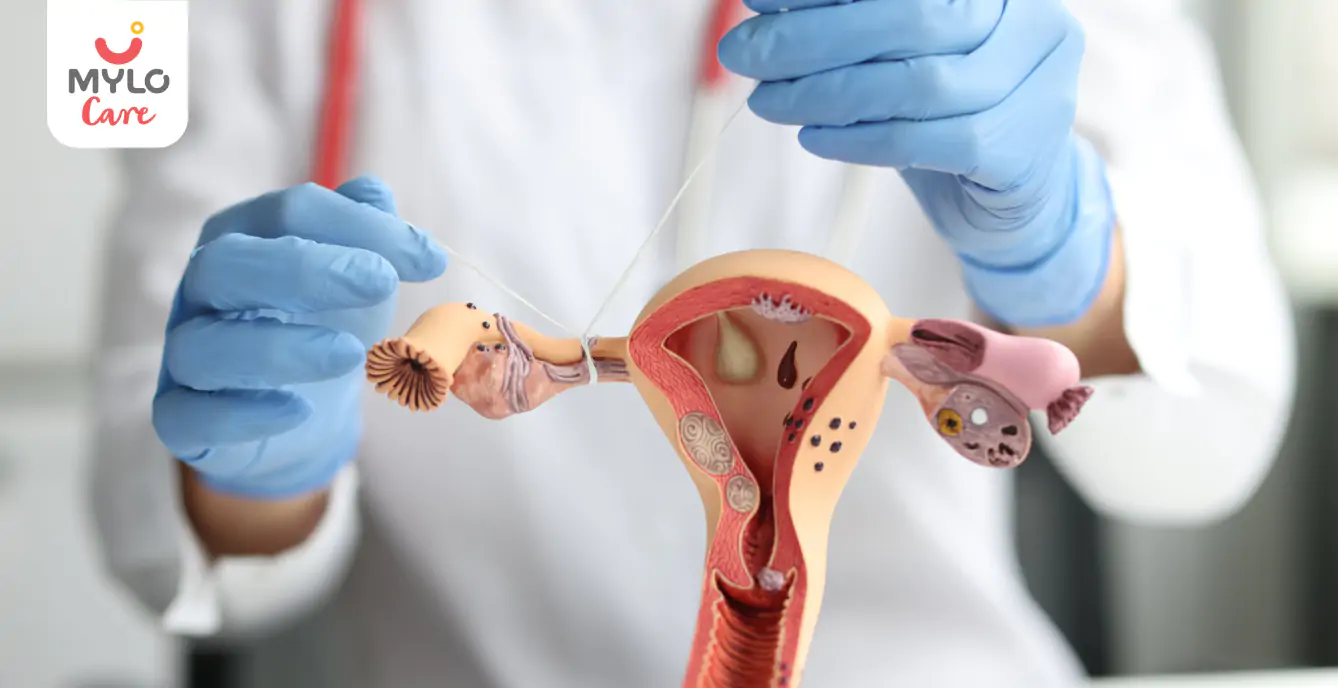Home

Electric or Manual Breast Pump: Which Is Right for You?
In this Article

Pregnancy
Electric or Manual Breast Pump: Which Is Right for You?
Updated on 16 February 2024
When it comes to choosing a breast pump, many new mothers are faced with the decision between an electric or manual breast pump. Both options have their pros and cons, and it's important to choose the one that best suits your needs and lifestyle. In this article, we will explore the key differences between electric and manual breast pumps, provide tips to help you make an informed decision, and address common questions and concerns about these devices.
Key Differences Between Manual Vs Electric Breast Pump
Let us understand the differences between these two types of breast pumps:
1. Efficiency and Convenience
One of the main differences between electric and manual breast pumps is the level of efficiency and convenience they offer. Electric breast pumps are powered by electricity or batteries, which means you don't have to manually pump the handle. This can be a time-saver, especially if you need to pump frequently or have a limited amount of time. On the other hand, manual breast pumps require you to manually pump the handle, which can be time-consuming.
2. Cost
Cost is an important factor for many new mothers. Electric breast pumps are generally more expensive compared to manual pumps. Manual breast pumps, on the other hand, are more affordable and budget-friendly. If you're on a tight budget or plan to use the pump infrequently, a manual breast pump may be a more cost-effective option.
3. Noise Level
Noise level is another factor to consider when choosing between an electric or manual breast pump. Electric breast pumps tend to be louder due to the motor and mechanical components. This can be a concern if you plan to pump discreetly in public or if noise is an issue for you or your baby. Manual breast pumps, on the other hand, operate silently since there are no mechanical parts. This can be an advantage if you prefer a quiet pumping experience.
4. Suction Strength
Electric breast pumps generally have more suction strength compared to manual pumps. This can be beneficial for mothers who have low milk supply or need to express milk quickly. The adjustable suction settings in electric pumps allow you to find the right level of comfort and efficiency. Manual breast pumps, on the other hand, rely on your hand strength to create suction. While they can still effectively extract milk, the suction strength may not be as powerful as electric pumps.
5. Portability
Portability is a crucial consideration, especially if you're planning to pump on the go or while traveling. Electric breast pumps can be bulkier and heavier due to the motor and additional components. This can make them less portable and harder to carry around. Manual breast pumps, on the other hand, are compact and lightweight, making them easier to transport and use anywhere. If you need a pump that you can easily take with you, a manual breast pump is a better choice.
6. Customization and Control
Electric breast pumps offer more customization and control options compared to manual pumps. They often come with adjustable suction levels, pumping patterns, and timers. This allows you to find the settings that work best for your comfort and milk production. Manual breast pumps, on the other hand, have limited customization options. You have to manually control the pumping speed and rhythm, which may not be as efficient or comfortable for some mothers.
7. Maintenance and Cleaning
Maintenance and cleaning are important aspects of using a breast pump. Electric breast pumps tend to have more components and require regular maintenance. This includes cleaning the tubing, valves, and flanges to ensure optimal performance and hygiene. Manual breast pumps, on the other hand, have fewer parts and are generally easier to clean and maintain. If you prefer a pump that requires minimal upkeep, a manual breast pump may be a better fit for you.
8. Power Source
The power source of a breast pump can impact its convenience and usability. Electric breast pumps are powered by electricity or batteries, which means you need access to a power outlet or have spare batteries on hand. This can be a limitation if you're in a location without electricity or forget to charge the batteries. Manual breast pumps, on the other hand, are powered by your hand strength, making them more versatile and independent of a power source. If you value flexibility and independence, a manual breast pump may be the right choice.
If you’re considering between an electric or manual breast pump, then Mylo offers both electric and manual breast pumps. If you have a busy schedule, need to pump frequently, or struggle with low milk supply, Mylo Baby electric breast pump may be the best choice. Its 9 adjustable suction levels and 3-phase pumping mode mimic the baby’s natural suction and can help stimulate milk production and make pumping more efficient.
On the other hand, if you have a limited budget, plan to pump occasionally, or value portability, the Mylo Baby manual breast pump can be a practical option. Our BPA-free, food grade and leak-proof manual breast pump is super affordable, easy to use, and portable.
You may also like : How to Sterilize Breast Pump: A Comprehensive Guide for New Moms
Tips to Help You Choose Between Electric or Manual Breast Pump
Now that you are familiar with the key differences between manual vs electric breast pump, here are five tips to help you make an informed decision:
1. Consider your lifestyle and pumping needs
Think about your lifestyle and how frequently you plan to pump. If you have a busy schedule or need to pump multiple times a day, an electric breast pump may be more efficient and convenient. If you only plan to pump occasionally or want a portable option, a manual breast pump may be sufficient.
2. Seek recommendations and reviews
Ask other mothers or consult online reviews to get insights into the performance and reliability of different breast pumps. Real-life experiences can provide valuable information that can help you make an informed decision.
3. Consider long-term usage
If you plan to breastfeed for an extended period or have multiple children, investing in a high-quality electric breast pump may be beneficial. However, if you plan to breastfeed for a shorter duration or have budget constraints, a manual breast pump may be a more practical choice.
5. Consult a lactation consultant
If you're still unsure which breast pump is right for you, consider consulting a lactation consultant. They can assess your specific needs and provide personalized recommendations based on your breastfeeding goals and circumstances.
You may also like: Does A Manual Breast Pump Help to Pump More Milk?
FAQ’S
1. Does electric breast pump produce more milk than manual?
The amount of milk you can express is primarily determined by your milk supply and your body's response to pumping. Both electric and manual breast pumps can effectively extract milk, but the efficiency may vary.
Electric breast pumps, with their adjustable suction levels and pumping patterns, can help stimulate milk production and mimic a baby's nursing pattern. This can be beneficial for mothers who struggle with low milk supply or need to pump frequently. Manual breast pumps, on the other hand, rely on your hand strength to create suction.
2. Are there any disadvantages of electric breast pump?
While electric breast pumps offer many benefits, they also come with a few potential disadvantages such as being expensive, producing more noise, requiring regular cleaning and maintenance of different components and being heavier.
3. Which pump is best for breastfeeding?
The best breast pump for breastfeeding ultimately depends on your individual needs and preferences. Both electric and manual breast pumps can effectively support breastfeeding, and the choice between the two will depend on various factors such as budget, lifestyle, and pumping goals.
You may also like : Breast Pump 101: The Ultimate Guide to Stress-Free Pumping Sessions
The Bottomline
Choosing between an electric or manual breast pump is a personal decision that depends on various factors such as lifestyle, budget, and pumping goals. Both options have their advantages and disadvantages, and what works for one mother may not work for another. It's important to consider your individual needs, consult with other mothers, and potentially seek guidance from a lactation consultant to make an informed decision.

Manual Breast Pump With Bottle (150 ml)
Anti Colic & BPA Free | Compact & Lightweight | Easy to hold | Easy to Clean
₹ 827

4.5
(6941)


24969 Users bought



Written by
Anandita Sharma
Drawing on more than a decade of expertise in administration, Anandita Sharma currently serves as a content operations e
Read MoreGet baby's diet chart, and growth tips

Related Articles
Top 100 Baby Names for Boys and Girls 2026 Edition: The Ultimate Trending & Meaningful Name Guide
The Ultimate Guide to the Best Romantic Web Series on OTT for Couples
Best Indian Crime Web Series Based on True Stories: The Ultimate Binge-Watch Guide (2026)
Dark & Suspenseful OTT Shows You Can’t Stop Watching: The 2026 Binge List
Related Questions
Hello frnds..still no pain...doctor said head fix nhi hua hai..bt vagina me pain hai aur back pain bhi... anyone having same issues??

Kon kon c chije aisi hai jo pregnancy mei gas acidity jalan karti hain... Koi btayega plz bcz mujhe aksar khane ke baad hi samagh aata hai ki is chij se gas acidity jalan ho gyi hai. Please share your knowledge

I am 13 week pregnancy. Anyone having Storione-xt tablet. It better to have morning or night ???

Hlo to be moms....i hv a query...in my 9.5 wk i feel body joint pain like in ankle, knee, wrist, shoulder, toes....pain intensity is high...i cnt sleep....what should i do pls help....cn i cosult my doc.

Influenza and boostrix injection kisiko laga hai kya 8 month pregnancy me and q lagta hai ye plz reply me

Related Topics
RECENTLY PUBLISHED ARTICLES
our most recent articles

Medical Procedures
Laparoscopic Ovarian Drilling: A Safe and Effective Solution for PCOS-Related Infertility

Headaches
Headache During Pregnancy: The Ultimate Guide to Causes and Cures

Scans & Tests
Fetal Doppler Scan During Pregnancy: In which week should you get it done?

Sleep
How Long Should Naps Be While Pregnant?

Fertility Problems
Blocked Fallopian Tubes: How They Affect Your Chances of Conceiving

How Do You Notify Your Employer That You Are Pregnant?
- The Ultimate Guide to Consuming Tapioca During Pregnancy
- Braxton Hicks Contractions or Real Labor: How to Tell Them Apart?
- Top 10 Tips For The Third Trimester Of Your Pregnancy
- Maternity Leave 101: Rules, Benefits & Timings for Expectant Working Women
- The A-Z Guide to Identifying Summer Vegetables for Kids
- Christian Baby Girl Names That Stand the Test of Time
- The A-Z Guide on Purple Colour Fruits and Vegetables for Kids
- The A-Z Guide on Red Colour Fruits & Red Colour Vegetables for Kids
- The A-Z Guide on Yellow Fruits & Yellow Colour Vegetables for Kids
- Cervical Cancer: Causes, Symptoms & Prevention
- The A-Z Guide to Identifying Stem Vegetables for Kids
- Can Fetal Heartbeat Disappear and Reappear?
- The Ultimate Guide to Teaching Children 20 to 30 Tables
- GK Questions for Kids from Nursery to Class 6


AWARDS AND RECOGNITION

Mylo wins Forbes D2C Disruptor award

Mylo wins The Economic Times Promising Brands 2022
AS SEEN IN

- Mylo Care: Effective and science-backed personal care and wellness solutions for a joyful you.
- Mylo Baby: Science-backed, gentle and effective personal care & hygiene range for your little one.
- Mylo Community: Trusted and empathetic community of 10mn+ parents and experts.
Product Categories
baby carrier | baby soap | baby wipes | stretch marks cream | baby cream | baby shampoo | baby massage oil | baby hair oil | stretch marks oil | baby body wash | baby powder | baby lotion | diaper rash cream | newborn diapers | teether | baby kajal | baby diapers | cloth diapers |




